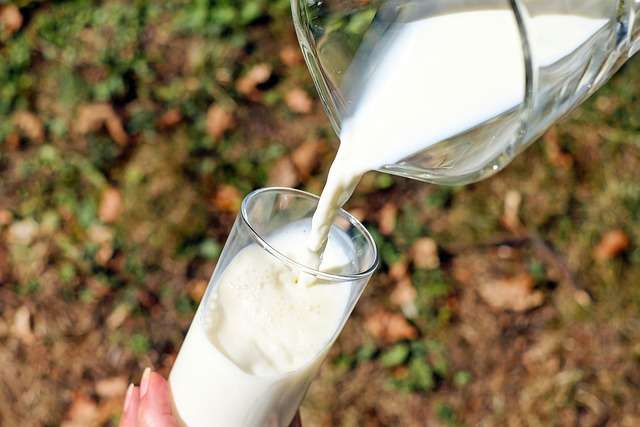When it comes to essential dietary components, milk has long been a staple in many households. Packed with nutrients and known for its versatility, milk plays a crucial role in maintaining a balanced diet. In this article, we’ll delve into the nutrition facts of milk, exploring its diverse nutrients, benefits, and potential concerns.
Introduction
Milk, often hailed as nature’s most complete food, contains an array of nutrients that are explained in the nutrition facts of milk and are essential for maintaining overall health. From childhood to adulthood, milk consumption offers various benefits that contribute to a well-rounded diet.

Nutrition Facts of Milk
Protein Content
Milk is a notable source of high-quality protein. It contains all nine essential amino acids, making it a valuable protein source for tissue repair, immune function, and enzyme production.
Carbohydrates in Milk
Milk’s main carbohydrate is indeed lactose, a type of sugar found naturally in the milk of mammals. Lactose provides a readily available source of energy for the body.

Fat in Milk
The fat content in milk varies based on its type. Whole milk contains a higher fat percentage, while skim milk has negligible fat content. Healthy fats present in milk support brain function and hormone production.
Vitamins and Minerals in Milk
Calcium
Milk is renowned for its calcium content, crucial for maintaining strong bones and teeth. Adequate calcium intake is essential for individuals of all ages to prevent osteoporosis and related bone disorders.
Vitamin D
Vitamin D enhances calcium absorption, promoting bone health. Many types of milk are fortified with vitamin D, ensuring optimal absorption.
Vitamin B12
Vitamin B12 is indeed crucial for both red blood cell formation and neurological function. Milk is a reliable source of this vitamin, especially for those following vegetarian or vegan diets.

Riboflavin (Vitamin B2)
Riboflavin plays a key role in energy production and antioxidant defense. Milk provides a significant portion of the daily recommended intake of riboflavin.
Health Benefits of Milk Consumption
Bone Health and Calcium
Calcium and vitamin D in milk work synergistically to maintain bone density and prevent fractures, especially as we age.
Muscle Building and Repair
Milk proteins aid in muscle recovery after exercise, making it a favorite among athletes.
Nutrient Absorption
Milk’s nutrient profile enhances the absorption of various minerals, amplifying their benefits.
Hydration
Milk’s water content contributes to hydration, especially in combination with its nutrients.
Different Types of Milk

Whole Milk
Whole milk contains a higher fat percentage and is rich in calories, suitable for growing children and those needing extra energy.
Low-Fat Milk
Low-fat milk offers a balance between nutrients and lower fat content, making it a popular choice for weight-conscious individuals.
Skim Milk
Skim milk has minimal fat content while retaining most other nutrients, appealing to those seeking to minimize calorie and fat intake.
Plant-Based Milk Alternatives
For individuals with lactose intolerance or dietary preferences, plant-based milk alternatives like almond, soy, and oat milk offer viable options.
Considerations for Lactose Intolerance
Lactose Intolerance vs. Dairy Allergy
Lactose intolerance stems from a deficiency of lactase, the enzyme needed to digest lactose. It differs from a dairy allergy, which involves the immune system.
Lactose-Free Milk Options
Lactose-free milk provides a solution for those with lactose intolerance, offering the same nutrients without digestive discomfort.
Milk and Weight Management
Role of Protein in Satiety
Protein-rich milk can help control appetite, contributing to weight management.
Controlling Caloric Intake
Moderation is key, as excessive calorie consumption from whole milk can hinder weight loss efforts.
The Controversy: Milk and Health Concerns
Dairy and Acne
The link between dairy consumption and acne is debated among experts, with some studies suggesting a potential association.
Hormones in Milk
Concerns exist about the presence of hormones in milk, although current evidence suggests minimal impact on human health.
Organic vs. Conventional Milk
Organic milk, produced without synthetic hormones, is preferred by those seeking to reduce potential chemical exposure.
Incorporating Milk into Your Diet
Cooking and Baking
Milk is a versatile ingredient in cooking and baking, adding flavor, moisture, and nutrients to various dishes.
Milk as a Beverage
From a refreshing drink to a post-workout recovery option, milk serves as a satisfying beverage.
Milk-Based Products
Milk yields an array of products like cheese, yogurt, and butter, each with its unique nutritional profile.
FAQs about Milk Nutrition
1. Is milk a good source of protein?
Yes, milk is an excellent source of high-quality protein.
2. Can lactose-intolerant individuals consume milk?
Lactose-free milk options are available for lactose-intolerant individuals.
3. Is organic milk worth the extra cost?
Organic milk may be preferred for those aiming to avoid synthetic hormones.
4. How does milk contribute to bone health?
Milk’s calcium and vitamin D content supports bone density and health.
5. Are plant-based milk alternatives equally nutritious?
Plant-based milk alternatives offer different nutrient profiles, but they can be a nutritious choice.
Conclusion
In conclusion, the nutrition facts of milk underscore its significance as a nutrient-rich beverage. Whether for bone health, muscle recovery, or overall nourishment, milk’s diverse nutrients contribute to a well-rounded diet. As with any dietary choice, moderation and individual
